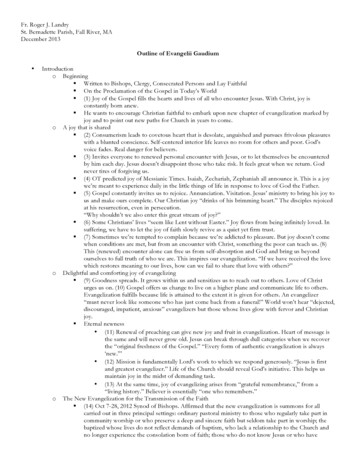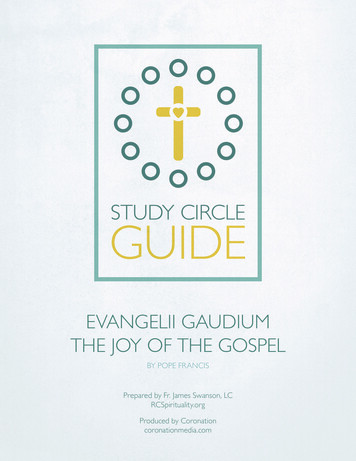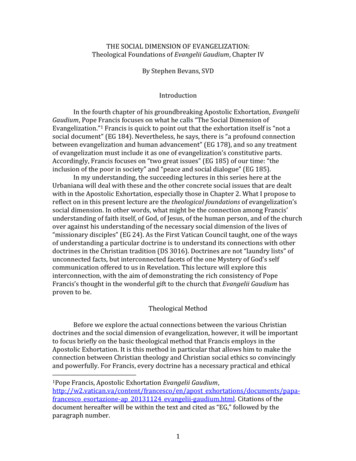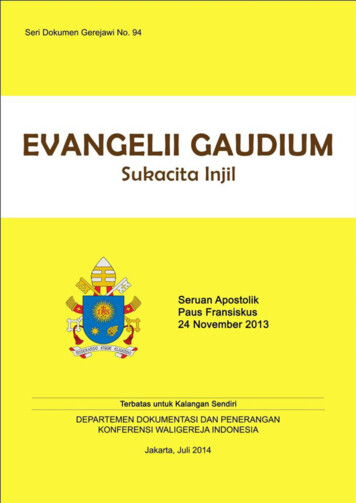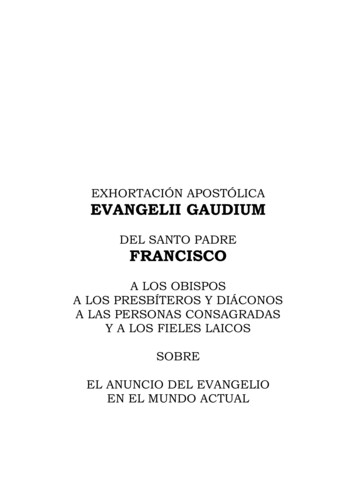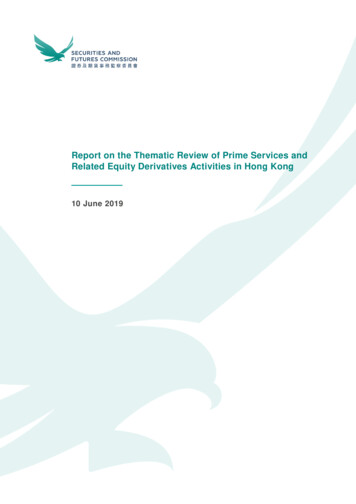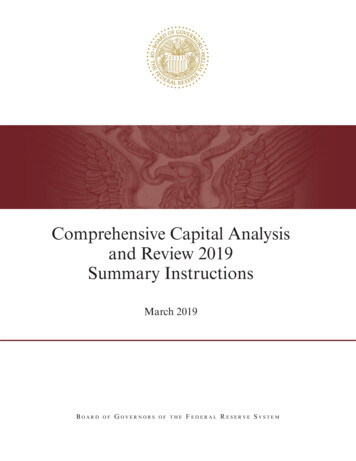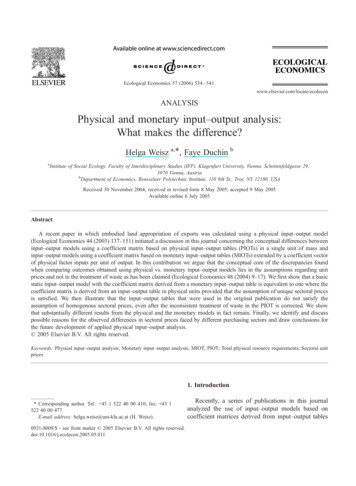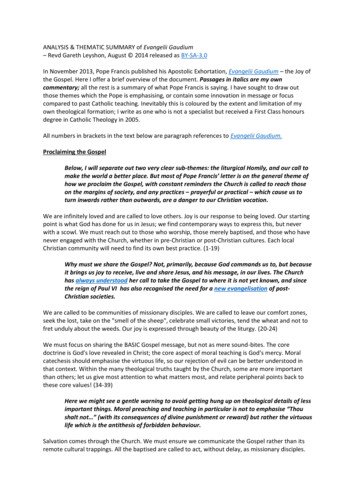
Transcription
ANALYSIS & THEMATIC SUMMARY of Evangelii Gaudium– Revd Gareth Leyshon, August 2014 released as BY-SA-3.0In November 2013, Pope Francis published his Apostolic Exhortation, Evangelii Gaudium – the Joy ofthe Gospel. Here I offer a brief overview of the document. Passages in italics are my owncommentary; all the rest is a summary of what Pope Francis is saying. I have sought to draw outthose themes which the Pope is emphasising, or contain some innovation in message or focuscompared to past Catholic teaching. Inevitably this is coloured by the extent and limitation of myown theological formation; I write as one who is not a specialist but received a First Class honoursdegree in Catholic Theology in 2005.All numbers in brackets in the text below are paragraph references to Evangelii Gaudium.Proclaiming the GospelBelow, I will separate out two very clear sub-themes: the liturgical Homily, and our call tomake the world a better place. But most of Pope Francis’ letter is on the general theme ofhow we proclaim the Gospel, with constant reminders the Church is called to reach thoseon the margins of society, and any practices – prayerful or practical – which cause us toturn inwards rather than outwards, are a danger to our Christian vocation.We are infinitely loved and are called to love others. Joy is our response to being loved. Our startingpoint is what God has done for us in Jesus; we find contemporary ways to express this, but neverwith a scowl. We must reach out to those who worship, those merely baptised, and those who havenever engaged with the Church, whether in pre-Christian or post-Christian cultures. Each localChristian community will need to find its own best practice. (1-19)Why must we share the Gospel? Not, primarily, because God commands us to, but becauseit brings us joy to receive, live and share Jesus, and his message, in our lives. The Churchhas always understood her call to take the Gospel to where it is not yet known, and sincethe reign of Paul VI has also recognised the need for a new evangelisation of postChristian societies.We are called to be communities of missionary disciples. We are called to leave our comfort zones,seek the lost, take on the "smell of the sheep", celebrate small victories, tend the wheat and not tofret unduly about the weeds. Our joy is expressed through beauty of the liturgy. (20-24)We must focus on sharing the BASIC Gospel message, but not as mere sound-bites. The coredoctrine is God's love revealed in Christ; the core aspect of moral teaching is God's mercy. Moralcatechesis should emphasise the virtuous life, so our rejection of evil can be better understood inthat context. Within the many theological truths taught by the Church, some are more importantthan others; let us give most attention to what matters most, and relate peripheral points back tothese core values! (34-39)Here we might see a gentle warning to avoid getting hung up on theological details of lessimportant things. Moral preaching and teaching in particular is not to emphasise “Thoushalt not ” (with its consequences of divine punishment or reward) but rather the virtuouslife which is the antithesis of forbidden behaviour.Salvation comes through the Church. We must ensure we communicate the Gospel rather than itsremote cultural trappings. All the baptised are called to act, without delay, as missionary disciples.
Tools we can use include: popular devotions; active listening; deliberate inculturation; charismsintegrated into the life of the church community; dialogue with science; the presence of Catholiceducational institutions in wider society. Our own church culture must be neither unwelcoming norbureaucratic, finding new ways to bring people together in urban settings. (110-134, 71-75)There is nothing new in the message that all members of parishes are called to bemissionary. But it is a sad reality that very few parishes in British Culture are truly “Fit forMission”.All members of the Church are called to share in this mission. For this, they should: develop thevalue of stable relationships, within and apart from marriage, relationships within which genuineconversation and growth can occur; affirmation/training, optimism, mutual support. Act, don'topine. Bless others. Overcome painful historical divisions. Pray for those who annoy them. Train laity(including women and young people) for leadership and give them opportunities; theologians mayneed to distance governance from Eucharistic presidency. (76-109 – positive aspects)Here and elsewhere Pope Francis has indicated that he is not going to change the Catholicposition on the ordination of women to the priesthood, but that the Church must developthe opportunity for women (and therefore also lay men) to take on much more significantleadership roles in the church.Loving enemies and reconciling with them is a fundamental Christian value. Specialprominence in our age of broken relationships and mobile populations will need to begiven to establishing stability and commitment in parishes, communities, friendships andmarriages.At the same time, beware: inferiority complex, sterile spiritual exercises, self-centred motivations(including personal glory and prosperity gospel), joyless pragmatism, retreating into a closed circle;seeking adherence to outdated Catholic forms, campaigning for liturgical or doctrinal purity, selfrealisation programmes, busy-ness, criticising others; macho or fatalist cultures; devotional trapswhich don't foster growth. (76-109 – negative aspects)Pope Francis here will give no solace to promoters of the Traditional Latin Mass nor thosewho make a hobby out of delating clergy. Presumably the traditional Catholic duty to saveone’s own soul is not one of the self-centred motivations the Pope opposes, but he wouldemphasise the understanding in Luke 17:33 and Catechism 1889 that the only way toachieve this is by laying down one’s life in the service of others. (In the spirit of celebratingour multi-faceted society, however, we must still acknowledge that there will be a certainsection of society for whom traditional forms of Catholic worship will appeal and thatthere is still a place in the Church for such practices, as long as they are not wrapped inteachings about the superiority of those who practice them and the inadequacies of thewider church.)Are our Church structures fit for mission? Dioceses and parishes must ensure they draw close to thepeople they are called to serve, especially those on the margins. Movements have their ownparticular callings, but must work in tandem with their local parish. Leaders must listen attentively tothe Church's critics and some decentralisation of structures will be helpful. (25-33)The call for decentralisation is in accord with the core Catholic principle of subsidiarity.
How is it humanly possible to spread the Gospel when faith is a spiritual gift? If technical precision orlongstanding customs don't communicate the core message, avoid these. Accommodate humanweakness and the gradual way people grow in understanding, both in the confessional and in otherencounters; communicate something good. (42-46)We must have open doors on our buildings, maximum access to the sacraments, little regard for ourinstitutional security, but a priority to move out to the poor with an offer of friendship with Jesus,meaning and purpose in life, and the support of a community of faith. (47-49)If in some Latin American cultures it is common for priests to refuse to baptise the childrenof unmarried mothers then it is easy to understand why the Pope needs to call for greateraccess to the sacraments. It is less clear what response the Pope will hope for from parishclergy when parents approach the Church with no intent of raising a child as a practisingCatholic but every hiope of gaining a place in the Catholic school.For those who are already members of the Church, there is a Gospel call to continuing growth. Allcatechesis must re-emphasise the kerygma: "Jesus loves you, died for you, walks with you toenlighten, strengthen and free you." Today we need to develop these themes: God loved us of hisown volition; we do not impose truth but appeal to freedom; we present a joyful and harmoniousbalance, not preaching philosophical stances. Use the arts. We must develop one-to-oneaccompaniment and encourage Bible study. (160-175)The appeal to freedom is in accord with Vatican II’s move away from ‘error has no rights’to recognising that human beings have a right to be wrong, and to come to know the truthin their own time.The call to develop one-to-one listening (169-173) points to important skills for formingintentional disciples, community organising, and mentoring confirmandi.Only the Holy Spirit can impel us to heartfelt evangelisation; we call upon Him! Let us avoid sterileprayer; let us beware of anything which hides us from social engagement. As true missionaries, let usremind ourselves of how Jesus enriches our life and take this message joyfully to others, answeringthe questions their hearts are asking. Let our motive be the Father's glory. We must enter into thelives of others, doing so humbly, gently and peaceably. Let us put our faith in God's help, even whenfruitfulness seems unlikely. Let us pray for the help of the Holy Spirit; let our prayer includeintercession and thanksgiving for those we serve. (259-283)Mary is mother of the Church, a praying presence and our intercessor. She is our model oftriumphing through darkness and tiredness, as one who is a humble handmaid defeating powerfulfoes. Many cultures have recognised her as their own. (284-288)
Making the World a Better PlacePope Francis wants a church which IS poor, and is FOR the poor. The poor make present in our midstthe suffering Christ, and so evangelise the wider church. We must listen to them, speak for them,and place them at the heart of the church. Every Christian must act for the poor, not only bycampaigning, but personally. Scripture makes it clear that our acts of mercy and almsgivingcontribute to the way God will have mercy on us when we are judged. (198-208)Because Jesus demonstrated the infinite dignity of human beings, Christians are compelled to work,locally, to make the world a better place. This requires transforming structures as well as helpingindividuals. Our priorities are: less able children; trafficked workers; vulnerable women; the unbornchild; the global ecosystem. Our lofty aim is education, healthcare, and employment for all.Structural change is also needed so global economic and political leaders prioritise the commongood, not maximum profit. Society becomes ‘alienated’ when the way it organises itself, the way itproduces and consumes goods, obstruct interpersonal communication. Society needs a betterdistribution of income, job creation, and promotion of the poor. (176-197, 209-216)Catholic Social teaching has pointed to these broad themes for more than 100 years; PopeFrancis points strongly to the duty of EVERY Christian to engage with these issues. Heindicates the contemporary issues of trafficking (211), less-able children (209) and our callto be stewards of the ecosystem (215) as well as signalling his own pro-life credentials(213-214). There is an implicit call for a society wedded to electronic communication andmail-order delivery to find a more personal way of doing commerce.Peace has to be built by a daily decision to seek justice for all. This needs political engagement,including learning about unfamiliar facets of local culture. Building a better society takes time(inimical to short-term political gain). Acknowledge conflict, resolve it, and make it a link in the chainof peace. Under Christ, all good things will be gathered together, a redeemed diversity. Be guided byincarnate realities, not unachievable theoretical ideals. Work locally while remaining aware of globalissues. Human society is meant to be multifaceted, not uniform; the Gospel must extend to everyfacet. (217-237)In this section the Pope offers four personal maxims about the way to peace: allowing time(222-225), seeking unity (226-230), being grounded in concrete realities (231-234) andvaluing the whole (235-237). In particular he warns against pursuing pious theoreticalideals, rather we need good role models of how the Gospel has been lived out in practice.The Church enters dialogue. With States, about the common good and human dignity, asking for theavoidance of crude generalisations about religion, but the upholding of religious freedom whichallows religious behaviour in public. With culture, respecting established scientific principles. Withother Christians, towards common expressions of proclamation, service and witness. With Jews,their depth of reading the Hebrew Scriptures. With all religions, in pursuit of peace. With otherreligions, seeking the stirrings of the Spirit who provokes mutual love. With all people who seektruth, goodness, and beauty, in the Court of the Gentiles. Muslim immigrants must be welcomed byChristians and their religious rights respected. We must avoid labelling the majority of Muslims bythe actions of a violent fringe. (238-258)There is little new here which has not already been set out by the Second Vatican Council,in its documents on religious freedom and on other religions. Comments on Islam clearlyreflect global events of recent years.
The HomilyPope Francis offers a detailed consideration (135-159) of the place of the homily within the liturgy (itis clear he is thinking mainly of Mass, especially Sunday Mass, rather than other liturgies, see 137).He reminds preachers that a good homily is a concise invitation to positive action, rooted in aparticular scripture. Not a lecture on doctrine, morals or scriptural exegesis, it uses beautiful imagesto encourage good action; it offers a rounded message expressed in a way which is accessible in theculture of its hearers, it avoids jargon and does not seek to present a detached idea.The homil
ANALYSIS & THEMATIC SUMMARY of Evangelii Gaudium – Revd Gareth Leyshon, August 2014 released as BY-SA-3.0 In November 2013, Pope Francis published his Apostolic Exhortation, Evangelii Gaudium – the Joy of the Gospel. Here I offer a brief overview of
